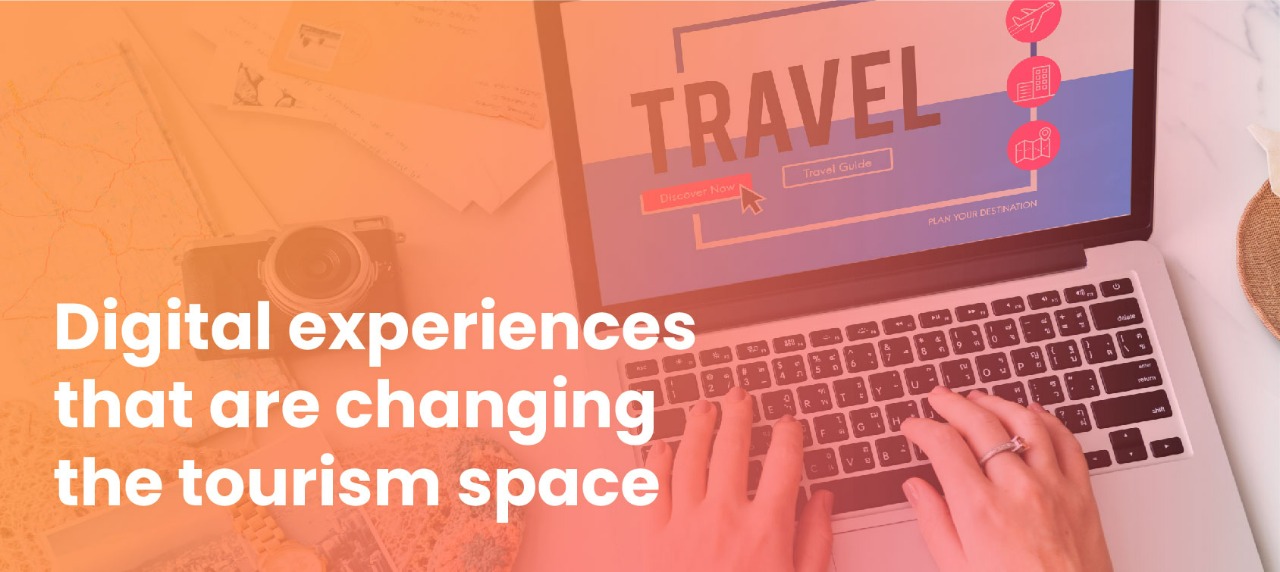
Technology, like in every other industry, serves as an enhancer and enabler.
Technology has a significant impact on the tourist sector, helping to lower costs, improve operational efficiencies, improve services and speed of operations, and—most importantly—help bring in transparency, which increases traveller comfort and trust.
Travellers experiences have significantly improved in the last decade, where technology has intervened to bring change – it serves as a tour guide, instant travel mart, restaurant recommender, location finder, luggage tracker and more.
With technology, suppliers to the tourism industry are able to quickly provide information, provide the best offers to coax a purchase, collaborate and aggregate in order to give greater value to travellers.
Augmented reality (AR) or virtual reality (VR) allows travel and tour operators, to showcase a heritage site, a local attraction or adventure options before a traveler decides to sign up and make an advance payment. We can explore beautiful locations all over the world from the comfort of our homes thanks to virtual travel.There are apps that allow you to experience the top of the globe without making the ascent or cross the Grand Canyon while hearing and seeing everything a real experience would have.
Tourism places are documented in a distinctive and immersive manner using VR production. VR experts can capture tourist places in alluring and engaging ways when utilised as a marketing tool. Instead of employing computer-generated pictures, 360 VR concentrates on the genuine surroundings. A 360 VR corporation uses specialised equipment to photograph an area, facilitating easier self-imagination for viewers. It may make a place come to life and entice travellers to consider visiting places they otherwise wouldn’t have thought about.
The the thrill as well as the safety of adventure travel, the emotions associated with travel to green forests and beautiful tropical destinations, are effectively being marketed with the help of VR.
Travel businesses offer virtual experiences of a variety of locales, including virtual tours of hotels, flights, and famous sites. Travelers particularly enjoy VR content linked to nature, animal, aquatic, and coastal services.
According to research, about 20% of consumers chose their vacation spot using virtual reality. About 25% of consumers claimed they intended to utilise virtual reality (VR) in the future to assist them in choosing a vacation spot.
Imagine using VR to help senior citizens experience some of the joy associated with travel…especially those receiving end-of-life care. By allowing them to virtually visit locations they never believed they would be able to visit, this special experience can improve the quality of their lives.
Instio, provides immersive audio-visual guided tours of historical cultural destinations through their applications. Instio advanced from the Goa TourismTech Accelerator Program in 2021. It satisfies the demands of the millions of tourists that go to historical sites each year in an intense desire to learn about Indian heritage.
Powerful AI chatbots in tourism technology that are available for help 24/7, and provide customers with answers to their questions in real-time, can coax them to make faster decisions. Customers can easily find solutions to their queries and get better deals. On the other end, using chatbots to better understand their potential customers and improve the levels of customer service, is a useful tool for the travel and hospitality industry.
The smartphone is essential for sharing travel information immediately on social profiles, leave comments and reviews on restaurants, hotels, tours, helps travellers to pre-book or spot purchase tours and trips. Such digital experiences that we tend to take for granted today, greatly increases happiness quotient for a traveller.
Companies storing data gathered from IoT enabled devices can create targeted personalized marketing campaigns thus ensuring greater success rates and better utilisation of marketing budgets.
While we are all familiar with the automated home, connected car, and wearable technologies, Internet of Things (IoT) technology in the travel industry can even guarantee that tourists can purchase a little extra peace of mind with gadgets that enable them to locate their luggage at any time through their cell phone. Travelers may even be able to better manage safety compliance standards and guarantee proper social distancing practises by wearing wearable technology at airports and other transportation hubs. The emphasis is on personalization in almost every sector, including tourism.
Offering additional control to travelers using their mobile devices improves their overall travel experience.
Collecting and preserving consumer data that enables businesses to provide customised offers based on customers’ search histories is another IoT application in the tourism industry. Customers can receive personalized offers for vacation spots, travel destinations, airlines, hotels.
Integrated digital solution for Mobile Check-In, Guest Management, Marketing and Service Quality Monitoring solution for hospitality companies, can enhance the guest experience and help hospitality providers attain operational efficiencies.
As technologies become more widely available and people’s expectations keep rising, innovations that include augmented-reality enhancements, and virtual reality experiences along with personalised offerings made with IoT technology, will become the norm.
Our Incubation centre, FiiRE, located in Goa, helps startups develop tourism tech solutions with technology products to reorganize, manage and grow the tourism sector.

